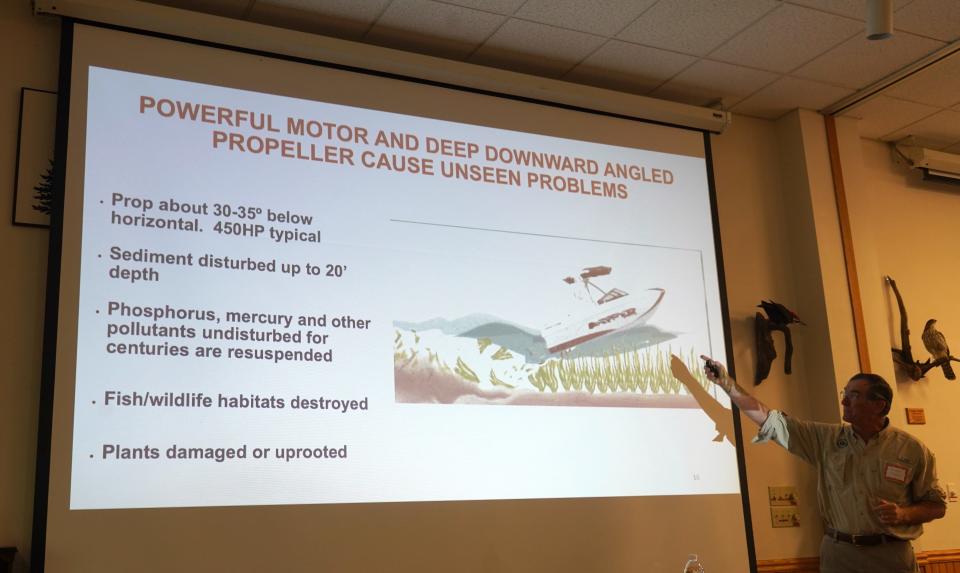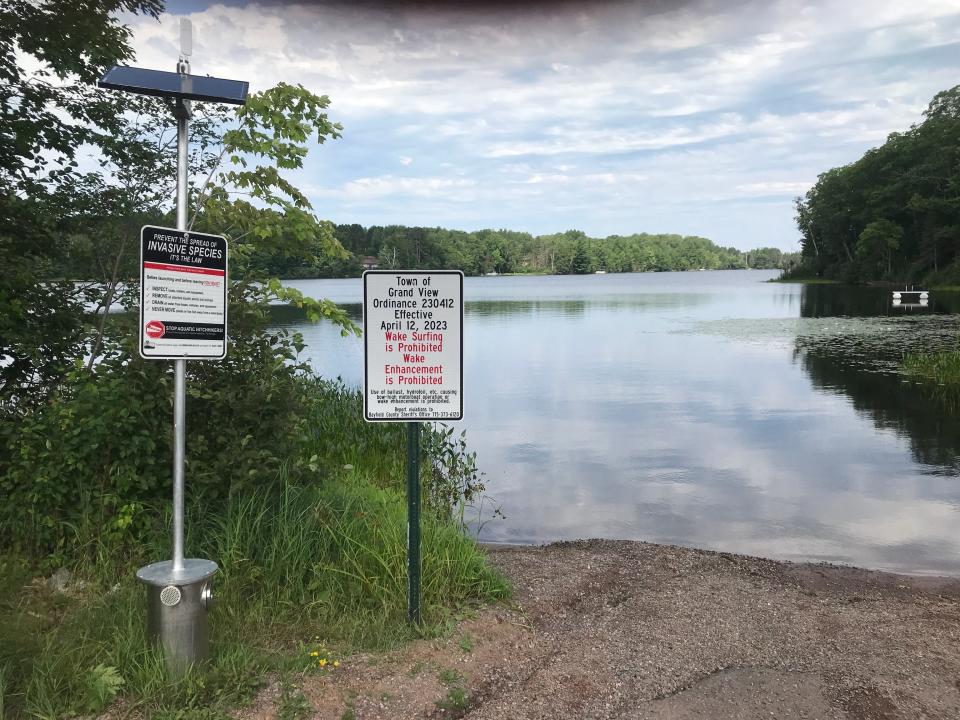Smith: Wake surfing drawing more scrutiny, calls for restrictions in Wisconsin
Richard Phillips of Presque Isle is a self-described "recovering lawyer" and former Illinois resident who now lives full-time on a remote lake in Vilas County.
Scott Rolfs, 57, of West Bend is an avid fisherman who has lived his entire life on the shore of Big Cedar Lake, a waterbody he calls a "glacial gem."
Though separated by 250 miles, the men share an urgent concern: the impacts of wake surfing on the lakes they love.
Wake boats are power craft with special ballast tanks designed to increase their displacement and create larger than normal waves for surfing or tubing. Several thousand pounds of lake water are commonly taken into the tanks to increase the wake.

Issues arise when the wake poses a danger to other boaters, habitat and wildlife, according to Phillips, Rolfs and other state residents.
The prop wash can also scour the lake bottom and damage aquatic vegetation. In addition, the ballast tanks present serious risks for transfer of aquatic invasive species.
Wake boats feature powerful engines (often 300 horse power or more) and are very expensive (typically more than $100,000). But their use on Wisconsin waters has increased substantially in recent years, according to Darren Kuhn, Department of Natural Resources boating law administrator.
With increased use has come increased conflict. Arguably no boating activity in Wisconsin has generated more concern in recent years than wake surfing.
The topic has come before the Natural Resources Board several times and local restrictions are popping up on wake surfing.

In Bayfield County, wake surfing has been prohibited on Diamond Lake
The most recent in Wisconsin is a prohibition on wake surfing on Diamond Lake in Bayfield County. The measure became effective April 12; it was passed by the local town board after local residents presented data and persuaded the change.
But such actions are the exception. Only about 10 ordinances to restrict or prohibit wake surfing exist in Wisconsin, Phillips said.
One is in Mequon-Thiensville on the Milwaukee River where homeowners and river users were tired of high waves and shoreline erosion caused by wake surfing.
Phillips and Rolfs are helping spread the word about wake surfing threats to lakes as well as steps residents can take to help control the activity.
Phillips made a presentation Saturday at the annual meeting of the Wisconsin Outdoor Communicators Association in Eagle River. He is a member of Last Wilderness Alliance, a Vilas County group that advocates for protection of natural resources. The organization has taken on wake surfing as one of its major causes.
Phillips took pains to explain he isn't against motor boats and wasn't some "sort of crazed tree hugger. In fact, he said, he has gasoline cars and spent his entire working career for Exxon Mobil.
"But I love our lakes," Phillips said. "And I'm convinced there is no greater threat to our lakes than wake surf boating."
Investigating the effects of wake boat surfing
The purpose of wake surfing is to displace as much water as possible.
When operated with ballast tanks full, the boats create a downward prop wash that hits the bottom and disturbs sediment and vegetation even on the bottom in 20 feet of water, Phillips said.
Though undoubtedly fun for wake surfers, Phillips ticked off the problems it creates:
Wake surfing makes much larger waves than other power boat activities, thereby causing more interference with other lake users.
The large waves also can cause more shoreline erosion.
The ballast tanks retain water and risk transferring invasive species from lake to lake.
"They intentionally create a wave that heretofore you had to go to the ocean to find," Phillips said. "Now it can be done on an inland lake. It is ripping up the lakes and making it impossible on small lakes for nature and fishing."
Flooding of loon nests is a big concern on lakes in northern Wisconsin, Phillips said.
Phillips showed an advertisement from a wake boat manufacturer with the slogan: "Rule the water."
"When wake boat surfing rules the water, fishing is not going to happen, sailing is not going to happen, loons are not going to happen," Phillips said.
Rolfs began investigating the effects of wake boat surfing on Big Cedar Lake a couple years ago. His work has included underwater and drone photography.
His videos show the stark difference at a favorite fishing spot on the lake. In 2014 the bottom was covered with aquatic vegetation and fish frequented the water. In 2023 it looks like a wasteland.
While Rolfs said it couldn't be proven the change was entirely the result of wake surfing, it was the most likely cause or contributor.
"I'm not against boating at all," Rolfs said. "But this wake surfing has taken things to new levels and I'm extremely concerned about its impacts on the health of our lakes."
Possible long-term ecological damage produced by wake surfing
Rolfs said the public debate about wake surfing has evolved in recent years. Previously, issues with wake boats focused on the size of the waves produced causing problems for other boaters, along with the “loud music” played by the operators of the boats.
New research from the University of Minnesota and reports from Wisconsin residents seem to indicate that there is potentially significant long-term ecological damage produced by wake surfing.
"As public bodies weigh this information, it is important to note that the focus is not on the operation of the boat, but rather the use of ballast and wave shaping devices, to create artificially large wake for certain types of water sports," Rolfs said.
The issue is coming up across the nation. Vermont has crafted a statewide regulation on wake surfing.
But in Wisconsin it's mostly up to local municipalities to pass ordinances restricting or prohibiting the activity.
Rolfs said the Big Cedar Lake Protection and Rehabilitation District has historically done a "fantastic job" of protecting and improving the lake's watershed.
"They’ve been ahead of the curve on ecological matters," Rolfs said. "They need to decide if they’ll step up and protect a glacial gem in southeastern Wisconsin or allow the lake to turn into a sterile waterpark for a small minority of lake users."
This article originally appeared on Milwaukee Journal Sentinel: Wake surfing drawing scrutiny, calls for restrictions in Wisconsin

